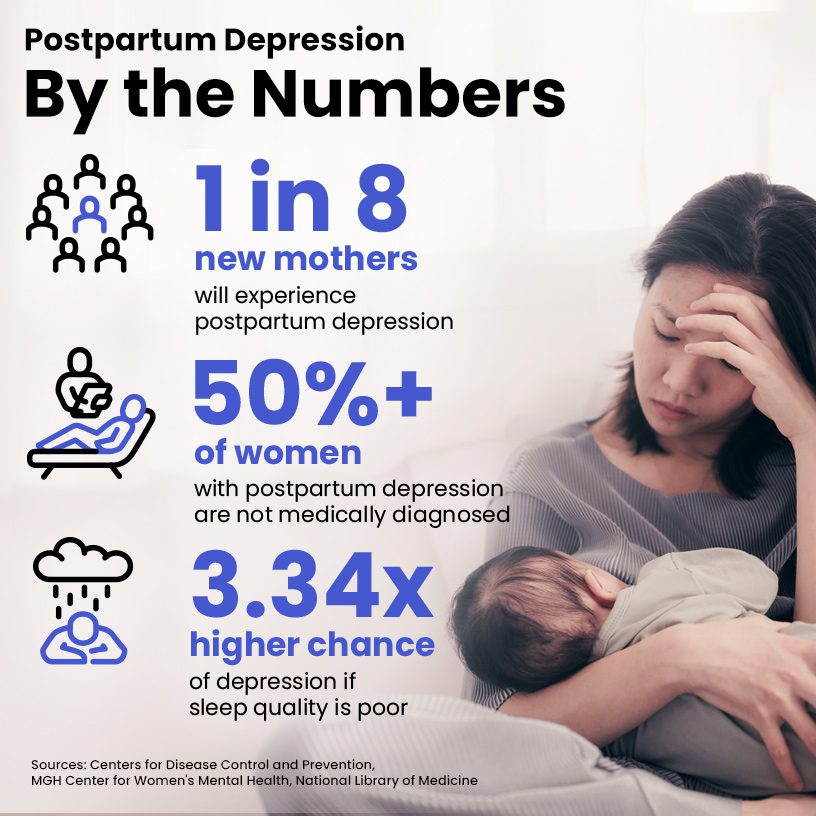How to Treat Postpartum Insomnia? To treat postpartum insomnia, establish a sleep routine and consider relaxation techniques, like meditation or deep breathing exercises. Seek professional help if these methods don’t improve sleep quality.
Experiencing insomnia after the arrival of a new baby can be challenging for new mothers. This common issue, known as postpartum insomnia, adversely affects both physical and mental health during a critical time of postpartum recovery. A well-rested body is essential not just for the new mom’s health, but also for her ability to care for her newborn effectively.
Addressing this issue head-on with proven strategies can greatly enhance the well-being of both mother and child. Quick interventions, like adhering to good sleep hygiene and making lifestyle adjustments, are often recommended. In certain cases, cognitive behavioral therapy or safe, doctor-approved medication might be considered. Prioritizing treatment helps mothers regain much-needed rest and maintain overall health.

Credit: www.momjunction.com
Understanding Postpartum Insomnia
Understanding postpartum insomnia is crucial for new mothers grappling with the condition. The arrival of a new baby is often coupled with overwhelming joy, but it can also bring about significant sleep disturbances for the mother. Postpartum insomnia can not only reduce a new mom’s quality of life but can also affect her ability to care for her newborn. In this section, we will explore what postpartum insomnia entails, its causes, symptoms, and duration.
Defining Postpartum Insomnia And Its Symptoms
Postpartum insomnia is a condition characterized by difficulty falling asleep or staying asleep after childbirth. Symptoms of this condition may include:
- Difficulty falling asleep despite feeling tired
- Lying awake at night, unable to sleep
- Experiencing restless sleep or waking up frequently during the night
- Feeling fatigued or not well-rested during the day
- Difficulty concentrating or feeling irritable due to lack of sleep
Common Causes Of Sleep Disruption In New Moms
A combination of physical, emotional, and lifestyle factors may contribute to sleep disruption in new moms. These include:
- Hormonal changes: Fluctuations in hormones after childbirth can affect sleep patterns.
- Breastfeeding: Irregular sleep schedules due to baby’s feeding demands can lead to sleep problems.
- Baby’s sleep patterns: Newborns often have an irregular sleep-wake cycle, affecting the mother’s sleep.
- Stress and Anxiety: Concerns about newborn care or a change in routine can increase stress levels, hindering sleep.
- Physical discomfort: Recovery from childbirth can cause discomfort that makes it hard to find a comfortable sleeping position.
Duration and Normalcy: How Long Can Postpartum Insomnia Last?
Duration And Normalcy: How Long Can Postpartum Insomnia Last?
The duration of postpartum insomnia varies from one mother to another. While some new moms may experience brief periods of sleep disruption, others might find themselves coping with insomnia for several weeks or months. Understanding the normalcy and duration of postpartum insomnia is critical for seeking the right treatments and maintaining mental health. Typically, postpartum insomnia should improve as the newborn begins to adapt to a more regular sleeping pattern and as the mother recovers from childbirth. Nonetheless, if sleep disturbances persist beyond several weeks, it is advisable to consult a healthcare provider.
Non-pharmacological Approaches To Manage Insomnia
Welcome to the gentle world of Non-Pharmacological Approaches to Manage Insomnia. With the birth of a new baby, mothers often find themselves struggling with postpartum insomnia, a common but disruptive condition. While medication is a route for some, many prefer to first try natural methods to reclaim their night’s rest. Below, we explore several effective non-pharmacological strategies tailored for new moms who long for a good night’s sleep.
Sleep Hygiene: Creating A Conducive Sleep Environment
Building a sleep-friendly environment is a foundational step in combating postpartum insomnia. Consider these tactics:
- Ensure your bedroom is dark, quiet, and cool for optimal sleep conditions.
- Invest in a comfortable mattress and pillows that support a restful posture.
- Reserve the bed for sleep and intimacy only, avoiding screens or work-related activities.
Synchronization: Aligning Sleep Schedules With Baby’s Routine
Aligning your sleep schedule with your baby’s can seem challenging, but it is a vital strategy in dealing with sleep disruption:
- Attempt to nap when your baby sleeps instead of using that time for chores.
- Seek assistance from a partner or family member to allow for longer sleep periods whenever possible.
- Establish a consistent bedtime routine for both you and your baby to encourage predictable sleep patterns.
Relaxation Techniques: Meditation, Breathing Exercises, And Mindfulness
Mindfulness and relaxation can ease the mind into sleep mode. Try these activities before bedtime:
- Meditation: Guided sessions can help clear your mind from daily stresses.
- Breathing exercises: Deep and measured breaths promote physical relaxation.
- Mindfulness: Being present can reduce anxiety and improve sleep quality.
Physical Health Considerations: Diet, Exercise, And Avoiding Stimulants
Maintaining a healthy lifestyle influences sleep quality. Keep these points in mind:
| Diet | Exercise | Stimulants |
|---|---|---|
| Eat balanced meals with plenty of vegetables, whole grains, and lean proteins. | Incorporate moderate exercise like a walk with the stroller or postnatal yoga. | Avoid caffeine and other stimulants, especially close to bedtime. |
“`
This HTML content provides a structured and SEO-friendly approach to discussing non-pharmacological methods to manage postpartum insomnia, with the use of headers, lists, and tables to organize information for easy reading and navigation. The content avoids fluff, is presented in short, active voice sentences, and emphasizes important points in bold for emphasis.
Professional Interventions And When To Seek Help
Experiencing insomnia after childbirth, while common, can be an exhausting obstacle for new mothers. When self-help and home remedies do not suffice, it becomes critical to explore professional interventions. Early intervention can improve sleep quality, overall health, and the mother-baby bond. Let’s dive into scenarios where you should consider professional help and the various interventions available.
Cognitive Behavioral Therapy (cbt) For Insomnia
Cognitive Behavioral Therapy, or CBT-I, is an evidence-based treatment for insomnia without the reliance on medications. CBT-I typically involves working with a trained therapist to explore beliefs and attitudes about sleep, developing sleep-promoting routines, and using techniques to reduce anxiety around sleep. It might be time to seek CBT-I if:
- Sleepless nights persist beyond several weeks postpartum.
- You experience significant distress or impairment in social, occupational, or other areas of functioning.
- You find yourself worried and anxious about sleep to the point of obsession.
The Role Of Medications: Risks And Benefits
Medications may occasionally be recommended as a short-term intervention for postpartum insomnia, particularly when symptoms are severe. However, the risks and benefits must be carefully weighed, especially when breastfeeding. Medications like sedative-hypnotics, antidepressants, or melatonin agonists might be considered, but only under direct supervision from a healthcare provider.
| Medication Type | Risks | Benefits |
|---|---|---|
| Sedative-hypnotics | Possible dependency and side effects | Immediate relief of symptoms |
| Antidepressants | Varied side effects and possible impact on infant | Dual treatment for depression and insomnia |
| Melatonin Agonists | Less known about long-term use | Could align sleep patterns more naturally |
Discuss with your healthcare provider if sleep deprivation is unmanageable, even after non-pharmacological interventions.
Support Systems: Family, Friends, And Mother’s Groups
Leveraging your support network can play a pivotal role in managing postpartum insomnia. Engagement with family, friends, and mother’s groups provides opportunities for sharing responsibilities and getting much-needed rest. Signs that you should extend your support network include:
- Feeling overwhelmed or constantly fatigued.
- Difficulty bonding with your newborn due to exhaustion.
- Lacking a safe space to express concerns and receive emotional support.
Recognizing And Treating Postpartum Depression And Anxiety
Postpartum depression and anxiety may exacerbate insomnia. Identifying these conditions is vital for a holistic treatment approach. Symptoms of depression or anxiety including but not limited to excessive worry, prolonged low mood, and disinterest in activities require prompt professional evaluation. Treatment may encompass therapy, support groups, and medication when appropriate. Early treatment of these conditions not only improves sleep but also affects overall well-being.
:max_bytes(150000):strip_icc()/insomnia-61e9c033bcec473aa8141510aff163bf.jpg)
Credit: www.verywellfamily.com

Credit: www.sleepfoundation.org
Frequently Asked Questions Of How To Treat Postpartum Insomnia?
How Long Can Postpartum Insomnia Last?
Postpartum insomnia can typically last a few weeks to several months after childbirth.
What Causes Insomnia After Giving Birth?
Postpartum insomnia can be caused by hormonal changes, stress, anxiety, and the frequent care newborns require.
Is It Normal Not To Be Able To Sleep After Giving Birth?
Yes, it’s normal for new mothers to experience sleep difficulties after giving birth due to hormonal shifts and newborn care demands.
Does Melatonin Help With Postpartum Insomnia?
Melatonin may help with postpartum insomnia, but consult a healthcare provider before use.
Conclusion
Navigating postpartum insomnia can be challenging, but with the right strategies, restful nights are within reach. Remember, addressing sleep issues early helps ensure well-being for both you and your baby. Don’t hesitate to seek support; it’s a sign of strength, not weakness.
As you apply the tips discussed, may you find the peaceful sleep you deserve and the energy to enjoy this special time with your new arrival. Sweet dreams and successful slumbers await on your journey through motherhood.

Born in Texas, Jennifer loves to spend time with her kids. Often, she shares her thoughts from the experience of being a mother. She focuses on surprising the Momoutfit readers with incredible information. Her vision is being a better mother, a visionary person.
